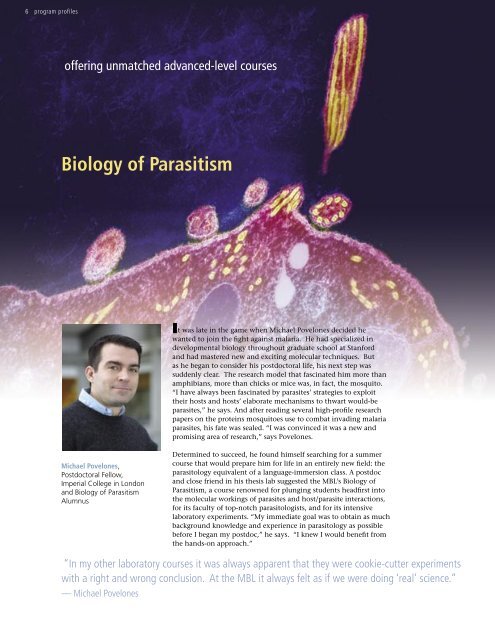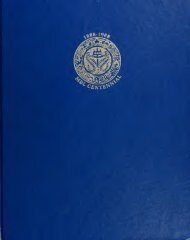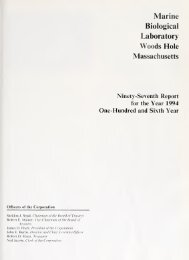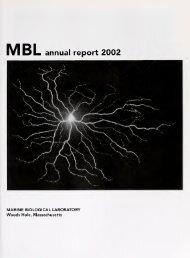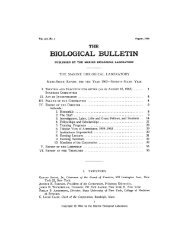6 program profilesoffering unmatched advanced-level coursesBiology of ParasitismIt was late in the game when Michael Povelones decided hewanted to join the fight against malaria. He had specialized indevelopmental biology throughout graduate school at Stanfordand had mastered new and exciting molecular techniques. Butas he began to consider his postdoctoral life, his next step wassuddenly clear. The research model that fascinated him more thanamphibians, more than chicks or mice was, in fact, the mosquito.“I have always been fascinated by parasites’ strategies to exploittheir hosts and hosts’ elaborate mechanisms to thwart would-beparasites,” he says. And after reading several high-profile researchpapers on the proteins mosquitoes use to combat invading malariaparasites, his fate was sealed. “I was convinced it was a new andpromising area of research,” says Povelones.Michael Povelones,Postdoctoral Fellow,Imperial College in Londonand Biology of ParasitismAlumnusDetermined to succeed, he found himself searching for a summercourse that would prepare him for life in an entirely new field: theparasitology equivalent of a language-immersion class. A postdocand close friend in his thesis lab suggested the MBL’s Biology ofParasitism, a course renowned for plunging students headfirst intothe molecular workings of parasites and host/parasite interactions,for its faculty of top-notch parasitologists, and for its intensivelaboratory experiments. “My immediate goal was to obtain as muchbackground knowledge and experience in parasitology as possiblebefore I began my postdoc,” he says. “I knew I would benefit fromthe hands-on approach.”“In my other laboratory courses it was always apparent that they were cookie-cutter experimentswith a right and wrong conclusion. At the MBL it always felt as if we were doing ‘real’ science.”— Michael Povelones
program profiles 7In e-mail dispatches from London’s Imperial College, written ashe began his postdoctoral research on the biological machinerybehind the mosquito’s ability to recognize and kill malariaparasites, Povelones said the Biology of Parasitism course preparedhim well for the road ahead. “There was always the exhilarationof doing experiments no one had ever done before, designed bya top researcher in the field,” he says. “In my other laboratorycourses it was always apparent that they were cookie-cutterexperiments with a right and wrong conclusion. At the MBL italways felt as if we were doing ‘real’ science.”The course also enabled Povelones to make powerful allies in hisnew field. “I knew from conversations with former students thatI would meet many prominent parasitologists,” he says. He did,and he has found it easy to solicit their advice and expertise. “Irecently consulted one professor by e-mail about a technical aspectof a fellowship proposal,” he says. “I also had a chance to pay apersonal visit to another professor’s laboratory. During the visit,he expressed an interest in what I was currently doing in the laband otherwise, which was a good demonstration that the bonds,both personal and professional, established during the summerare long lasting.”“An hour of conversation with an experienced colleague isworth days in the library. “Through classic MBL course activities, including late nights inthe lab, preparing a science-themed float for the annual WoodsHole July 4 th parade, and occasional bonding at the local bar withclassmates, lecturers, and course directors, Povelones also madelasting friendships and met important colleagues.“I expect they will provide a sounding board and expert opinionsfor research proposals I will develop,” he says. “An hour ofconversation with an experienced colleague is worth days in thelibrary. Plus, friends will go the extra mile to help you find whatyou need if they don’t know themselves.”Armed with his newfound knowledge of parasites, memories ofthe MBL, and the support of new friends, allies, and colleagues,Povelones is entrenched in his new lab and ready for battle.“I believe curing malaria is a realizable goal that will requirea considerable and coordinated effort on different fronts. Myresearch could directly seed projects that represent two of thenewer fronts in the fight,” he says. Among other things, he hopesto discover genes that could in the future be exploited to generateparasite-resistant mosquitoes or contribute to the developmentof “smart pesticides” that block parasite transmission frommosquito to human. “There is a hard road ahead, but I am eager tocontribute to this field as there is now a realistic view and respectfor the enemy,” he says. “I feel a sense of excited anticipation, as ifthe armies are gathering for an all-out assault.”OVERVIEW: The MBL boasts six of the mostsought-after graduate and post-graduatelevel biology courses available anywhere,as well as numerous special topics coursesin emerging fields. Courses attract starstudents and faculty from around theglobe, so admission is highly competitive.OUR INTENSIVE, HANDS-ON ADVANCEDCOURSES INCLUDE: Biology of Parasitism,Embryology, Microbial Diversity, NeuralSystems & Behavior, Neurobiology,Physiology, Advances in GenomeTechnology and Bioinformatics, Analytical& Quantitative Light Microscopy,BioMedical Informatics, Frontiers inReproduction, Methods in ComputationalNeuroscience, Molecular Biology of Aging,Molecular Mycology, Neural Development& Genetics of Zebrafish, Neuroinformatics,Optical Microscopy & Imaging in theBiomedical Sciences, Pathogenesis ofNeuroimmunologic Diseases, SummerProgram in Neuroscience, Ethics & Survival,Workshop on Molecular Evolution, andFundamental Issues in Vision Research.FUNDING: MBL courses are supportedby generous contributions from theHoward Hughes Medical Institute,Burroughs Wellcome Fund, WilliamRandolph Hearst Foundation, The EllisonMedical Foundation, the Gordon andBetty Moore Foundation, WaksmanFoundation for Microbiology, MerckResearch Laboratories, The Company ofBiologists, Ltd., World Health Organization,Society for Developmental Biology, Societyfor Neuroscience, The U.S. NationalAcademies, National Eye Institute, NationalLibrary of Medicine, American Society forReproductive Medicine, and Aquatic Eco-Systems, Inc.
- Page 1 and 2: MBL7 MBL StreetNon-profit Org.U.S.
- Page 5: contents1 report of the director an
- Page 8 and 9: 2 report of the director and ceoTha
- Page 10 and 11: 4 program profiles“Our lives are
- Page 14 and 15: 8 program profilestraining pre and
- Page 16 and 17: 10 program profilesforging powerful
- Page 18 and 19: 12 program profilesengaging undergr
- Page 20 and 21: 14 program profilesexciting k-12 te
- Page 22 and 23: 16 researchresearchThe MBL is one o
- Page 24 and 25: 18 researchgenomes. The National Ae
- Page 26 and 27: 20 researchPublicationsAmaral Zettl
- Page 28 and 29: 22 researchThe High Cost of Coastal
- Page 30 and 31: 24 researchJohn Hobbie Named MBL Di
- Page 32 and 33: 26 researchwhitman centerThe Whitma
- Page 34 and 35: 28 researchA New Twist on Power Wal
- Page 36 and 37: 30 researchfellowshipsMBL Research
- Page 38 and 39: 32 researchAlbert and Ellen Grass F
- Page 40 and 41: 34 researchFriday Evening Lecture S
- Page 42 and 43: 36 researcharchitectural dynamics i
- Page 44 and 45: 38 researchBUMP staff, cont.PH.D. S
- Page 46 and 47: 40 researchmarine resources program
- Page 48 and 49: 42 researchMarine Resources Program
- Page 50 and 51: 44 researchprogram in molecular phy
- Page 52 and 53: 46 researchlaboratory of aquatic bi
- Page 54 and 55: 48 researchlaboratory of norman wai
- Page 56 and 57: 50 educationsummer coursesBiology o
- Page 58 and 59: 52 educationGreenberg, Everett, Uni
- Page 60 and 61: 54 educationMaul, Kristen, City Col
- Page 62 and 63:
56 educationPata, Veena, National I
- Page 64 and 65:
58 educationspecial topics coursesA
- Page 66 and 67:
60 educationMaiato, Helder, Institu
- Page 68 and 69:
62 educationBrower, Stewart, Univer
- Page 70 and 71:
64 educationFACULTYCurran, Sean, Ma
- Page 72 and 73:
66 educationGeunes-Boyer, Scarlett,
- Page 74 and 75:
68 educationSTUDENTSAparicio, Paul,
- Page 76 and 77:
70 educationother educational progr
- Page 78 and 79:
72 educationscholarship awardsIn 20
- Page 80 and 81:
74 educationCaswell Grave Scholarsh
- Page 82 and 83:
76 educationMilton L. Shifman Endow
- Page 84 and 85:
78 mblwhoi librarytrends, and curre
- Page 86 and 87:
80 financialsfinancialsreport of th
- Page 88 and 89:
82 financialsOperating History and
- Page 90 and 91:
84 giftsWe are grateful as well to
- Page 92 and 93:
86 giftsRestricted gifts(up to $9,9
- Page 94 and 95:
88 giftsMEMBER($1,000 - $2,499)Edwa
- Page 96 and 97:
90 giftsJohn E. Hobbie Fund for Sci
- Page 98 and 99:
92 giftsMr. and Mrs. J. Sterling Cr
- Page 100 and 101:
94 giftsLectureshipsJohn J. Cebra L
- Page 102 and 103:
96 gifts10th AnniversaryDr. Eva M.
- Page 104 and 105:
98 giftsMBL AssociatesThe Associate
- Page 106 and 107:
100 giftsMr. James K. TaylorMrs. Al
- Page 108 and 109:
102 giftsMBL Golf OutingIn July, MB
- Page 110 and 111:
104 giftsFellowships Established in
- Page 112 and 113:
106 giftsSemester in Environmental
- Page 114 and 115:
108 governance & administrationgove
- Page 116 and 117:
110 governance & administrationcorp
- Page 118 and 119:
112 governance & administrationDr.
- Page 120 and 121:
114 governance & administrationcoun
- Page 122 and 123:
116 governance & administrationadmi
- Page 124:
118 governance & administrationPhot


